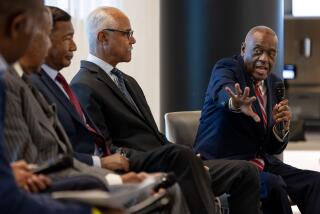Cold War Certificate Jogs Memories for a 1950s NATO Soldier
- Share via
I read in the paper the other day that the government has decided that I am eligible for a Cold War Recognition Certificate for “having served in the long postwar struggle with the Soviet Union.”
“All members of the armed forces and the federal government civilian personnel who faithfully served the United States during the Cold War era are eligible,” the Pentagon said. This certificate is designed for those in service from Sept. 2, 1945, when Japan surrendered, to Dec. 26, 1991, when Mikhail S. Gorbachev resigned as president of the Soviet Union, thus marking the end of the Cold War.
There are 22 million of us eligible for this honor. The Pentagon hastened to say that no money goes with it. The story didn’t say why this was being offered, or how much fulfilling this promise would cost if all 22 million asked for a certificate, even if no money came with it. (Later stories said the certificate was championed by a Republican congressman at the request of a constituent and that the operation had been budgeted for $600,000 the first year.)
I mentioned this odd tale to a friend. “Why don’t you tell the government that you would be happy to give up the certificate if they would spend the money on some more cruise missiles to smash the Yugoslavs with?” he suggested, noting that we seem to be running short of those deadly weapons.
His remark made me think. I was once a proud member of the NATO army, then in its young age, in 1956 and 1957, in Germany. I was a specialist third class, chief battalion radio operator for the 36th Armored Infantry Battalion of the Third Armored Division of the U.S. Army.
We knew we were in NATO, for every evening, in our Schlosskaserne (castle barracks) in the little city of Butzbach, in Hesse, our band played the “Star-Spangled Banner” and the lovely Haydn melody made unlovely by the German words, “Deutschland, Deutschland ueber alles, ueber alles in der Welt.” We were there to protect our new friends and recent enemies, the Germans, against our old friends and new enemies, the Russians. Our principal task was to deflect, for as long as possible, the hordes of Russian armor and men we supposed would pour from East Germany through the pass in the mountains and hills known as the Fulda Gap.
This was the ancient entryway into Western Germany from the East. When excavation work was done for our officers’ housing, it uncovered long-buried remnants of the camp of the Romans’ 22nd legion, which for two centuries stood guard on this very spot for the Empire against its eastern enemies. In the little museum of the relics of the camp were some elements of the cult of Mithras, whose catechumens were baptized by the blood of bulls slaughtered on the grates above the pits in which the new devotees waited. The cult was enormously popular among the legions, until it was supplanted by the new Christianity approved by the Emperor Constantine in AD 314.
We were very conscious that it was a kind of war we were engaged in. The great war in which our fathers and uncles had fought was only 11 years gone; the Korean War, which most though not all of us had barely escaped, was just ended.
Our service was not without danger. A couple of weeks ago, when I read about the three American soldiers who were captured by Serbian forces in Yugoslavia, I remembered so well the Requiem Mass in the German Roman Catholic Church for the two American soldiers who were crushed to death by American tanks as they were sleeping on the ground in a huge military maneuver in which many thousands of us were participating. Soldiers are soldiers; we were not given certificates of survival.
As NATO soldiers, our hearts leaped up as we paraded, thousands strong, on a vast parade ground near Frankfurt for our NATO commander in chief, American Gen. Lauris Norstad. We were deeply moved when, in the fall of 1956, the Hungarians had revolted against their Soviet masters; we were on maneuvers in the German countryside, and the Germans constantly asked us, “Gegen Sie nach Ungarn?” (Are you going to Hungary?) We, of course, let the Hungarian revolution against the Soviet Union die on the vine.
And when we came home the next year, from Bremerhaven to Brooklyn, on a troopship, the new Hungarian soldiers in the U.S. Army, taken in for their new allegiance and service and their opposition to communism, wept for joy when they saw a 15-story apartment house in Brooklyn, thinking it was the United Nations headquarters.
More to Read
Sign up for Essential California
The most important California stories and recommendations in your inbox every morning.
You may occasionally receive promotional content from the Los Angeles Times.












